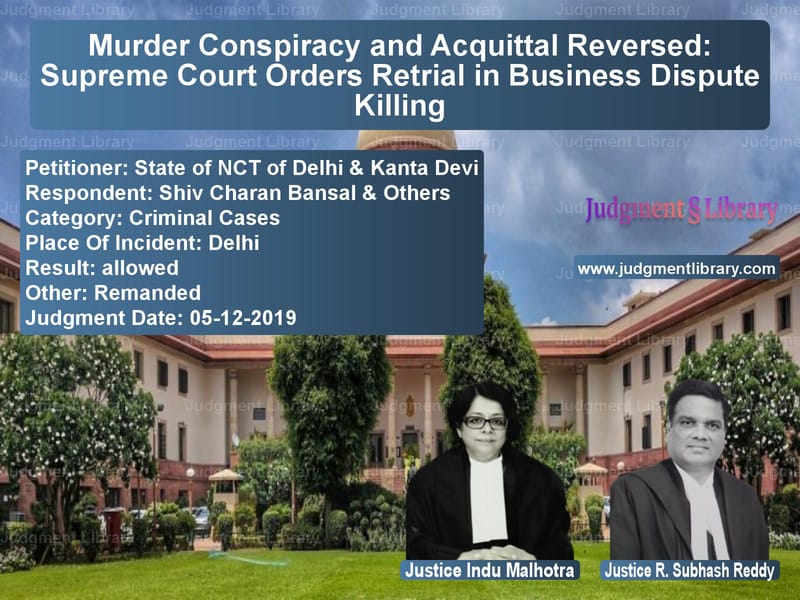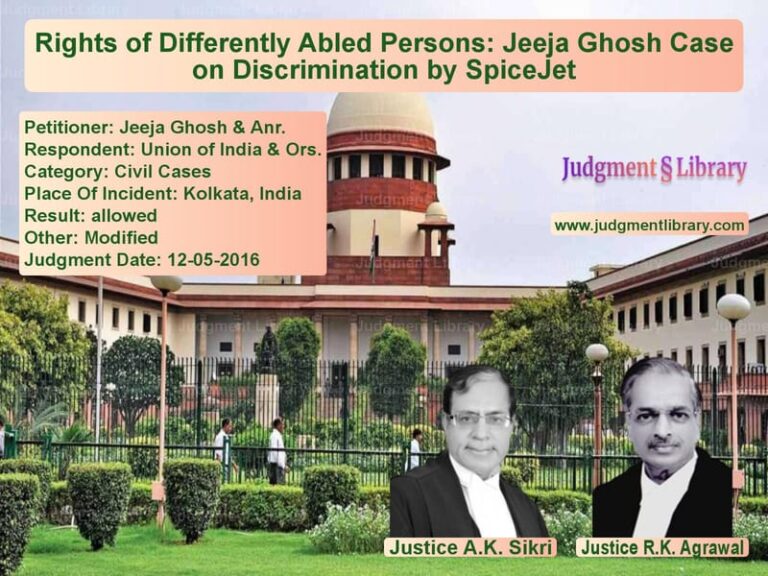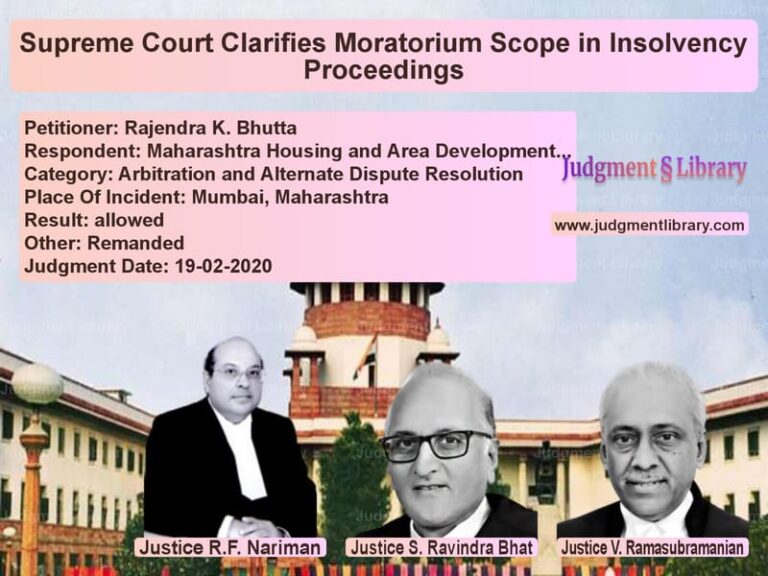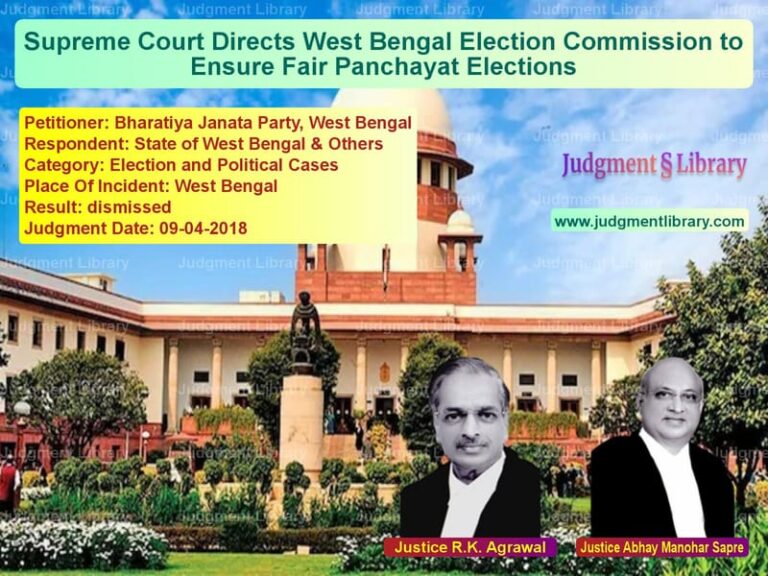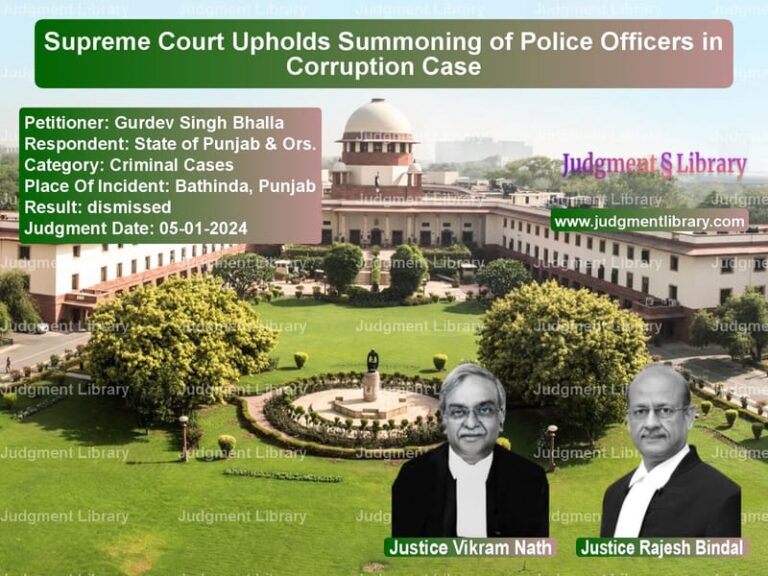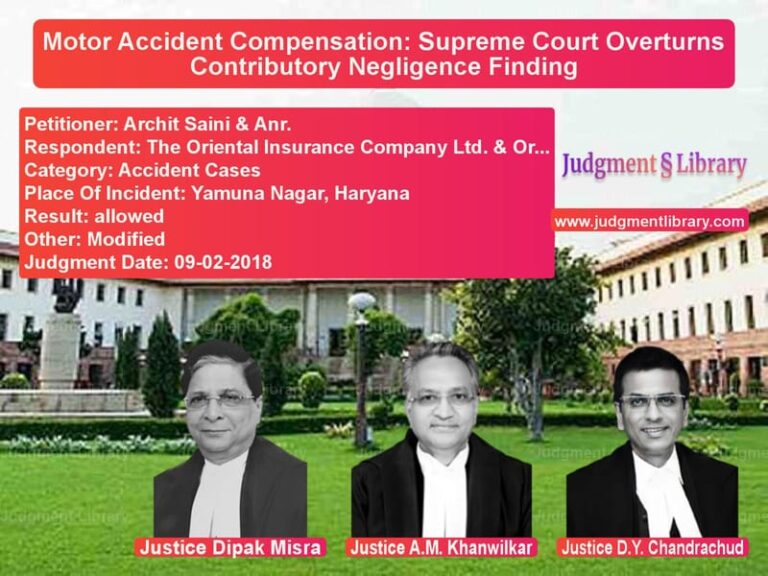Murder Conspiracy and Acquittal Reversed: Supreme Court Orders Retrial in Business Dispute Killing
The case of State of NCT of Delhi v. Shiv Charan Bansal & Others is a significant ruling concerning criminal conspiracy, business disputes, and contract killing. The Supreme Court, in its judgment dated December 5, 2019, reversed the acquittal of key accused persons and ordered a retrial in a murder case stemming from a financial dispute over chit funds and business ownership. The judgment provides a detailed analysis of criminal conspiracy, the role of circumstantial evidence, and the importance of call records and forensic findings in murder investigations.
Background of the Case
The case arose from the murder of S.N. Gupta, a businessman, who was shot dead at his residence in Delhi on March 21, 2006. The prosecution alleged that the murder was a premeditated act orchestrated by business associates over financial disagreements. The deceased and his son had invested significant amounts in chit fund schemes run by the accused, Shiv Charan Bansal and his son Sachin Bansal. Disputes arose when the accused refused to return the invested amounts, leading to tension between the parties.
The prosecution contended that the accused conspired to have S.N. Gupta killed to eliminate financial liabilities and gain control over a jointly owned business. The crime was allegedly carried out by hired contract killers, with support from co-conspirators who provided logistical assistance, weapons, and intelligence about the victim’s routine.
Petitioners’ Arguments
The State of NCT of Delhi and the complainant, Kanta Devi, argued that:
- The trial court erred in discharging key accused persons despite strong circumstantial evidence.
- Phone call records between the accused before and after the murder established a pattern of coordination.
- Ballistic and forensic reports confirmed that the murder weapon was recovered from an associate of the accused.
- Financial motives, as evidenced by statements from multiple witnesses, pointed to a conspiracy.
- The initial police investigation was flawed, leading to gaps in the prosecution’s case, which should not have resulted in acquittals.
Respondents’ Arguments
The defense contended that:
- There was no direct evidence linking the accused to the crime.
- The prosecution relied solely on circumstantial evidence and call records, which do not prove intent to murder.
- The alleged financial disputes did not amount to a motive strong enough to sustain charges under Section 302 IPC.
- The lower court had rightly discharged the accused due to lack of conclusive evidence.
- Many of the prosecution’s witnesses had financial interests in the case and could not be considered neutral.
Supreme Court’s Analysis
The Supreme Court meticulously examined the evidence and found that:
- The call records of the accused showed frequent communication before and after the murder.
- The accused had a strong financial motive to eliminate the deceased.
- Statements from the victim’s family and business associates consistently attributed the crime to financial fraud and misappropriation.
- Forensic evidence confirmed that the bullets retrieved from the victim’s body matched a gun found in possession of one of the accused.
- The destruction of financial records by the accused suggested an attempt to cover up financial misdeeds.
The Court highlighted:
“A criminal conspiracy is generally hatched in secrecy, and it is difficult, if not impossible, to obtain direct evidence. The manner and circumstances in which the offence has been committed, and the level of involvement of the accused persons, are relevant factors.”
Key Legal Precedents Cited
The Court referred to several landmark rulings, including:
- State of Bihar v. Ramesh Singh – Establishing that strong suspicion is sufficient for framing charges.
- R. Venkatakrishnan v. CBI – Emphasizing the role of circumstantial evidence in conspiracy cases.
- Kehar Singh v. State – Stating that conspiracies are typically proven through indirect evidence.
Final Judgment
The Supreme Court ruled:
“The materials gathered by the prosecution raise a strong suspicion against the accused. The Sessions Court and the High Court were not justified in discharging them. We, therefore, direct a retrial of the accused.”
The Court ordered:
- Reinstatement of charges against the accused under Section 302 (murder) and Section 120B (criminal conspiracy) IPC.
- Expedited trial proceedings to be concluded within six months.
- Re-examination of forensic and financial evidence in the case.
Impact of the Judgment
This ruling has significant implications:
- It reinforces the role of circumstantial evidence in murder trials.
- It highlights the importance of forensic and financial records in proving conspiracy.
- It strengthens the accountability of business disputes leading to criminal actions.
- It serves as a precedent for retrials in cases where key accused are discharged due to gaps in initial investigations.
Conclusion
The Supreme Court’s decision in State of NCT of Delhi v. Shiv Charan Bansal & Others reaffirms the principle that criminal conspiracies must be evaluated based on collective evidence rather than isolated incidents. The ruling ensures that all angles of a case are examined before acquittals are granted and underscores the responsibility of judicial authorities to ensure thorough and fair trials.
Petitioner Name: State of NCT of Delhi & Kanta Devi.Respondent Name: Shiv Charan Bansal & Others.Judgment By: Justice Indu Malhotra, Justice R. Subhash Reddy.Place Of Incident: Delhi.Judgment Date: 05-12-2019.
Don’t miss out on the full details! Download the complete judgment in PDF format below and gain valuable insights instantly!
Download Judgment: State of NCT of Delh vs Shiv Charan Bansal & Supreme Court of India Judgment Dated 05-12-2019.pdf
Direct Downlaod Judgment: Direct downlaod this Judgment
See all petitions in Murder Cases
See all petitions in Fraud and Forgery
See all petitions in Attempt to Murder Cases
See all petitions in Judgment by Indu Malhotra
See all petitions in Judgment by R. Subhash Reddy
See all petitions in allowed
See all petitions in Remanded
See all petitions in supreme court of India judgments December 2019
See all petitions in 2019 judgments
See all posts in Criminal Cases Category
See all allowed petitions in Criminal Cases Category
See all Dismissed petitions in Criminal Cases Category
See all partially allowed petitions in Criminal Cases Category

